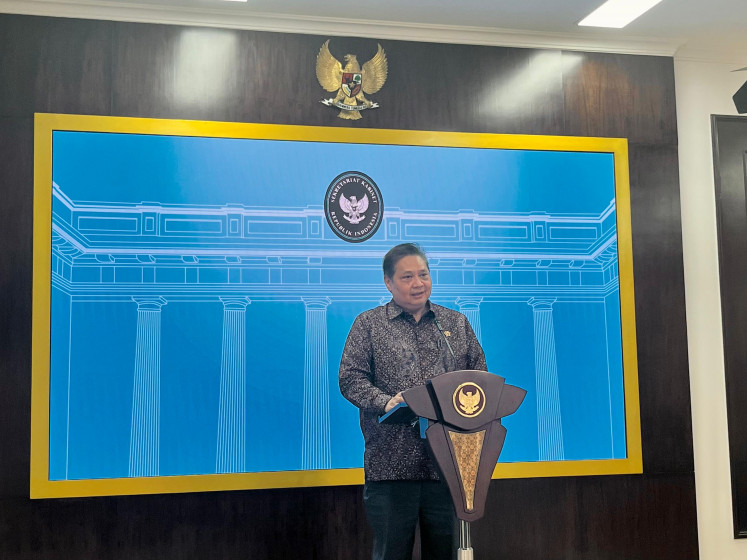Securing growth momentum in 2023
Both domestic and external factors play a big role in Indonesia’s impressive economic growth.
Change text size
Gift Premium Articles
to Anyone

I
ndonesia has become one of the Group of 20 countries – the world's twenty largest economies – that is resilient against this year’s multiple economic downturn cycles. It has managed to overcome the impact of the Omicron variant, Russia's invasion of Ukraine that triggered a global food security problem and energy crisis, and persistent high global inflation leading to interest rate hikes and financial turmoil (flight-to-quality). In fact, Indonesia’s economic performance is regarded among the best in G20 economies and other countries.
Through economic turbulence, Indonesia’s economy evinces solid momentum as the gross domestic product expanded by 5.40 percent year-on-year (yoy) in the first nine months of 2022, with an increasing pace in every quarter. This achievement needs to be greatly appreciated since the economy could still be able to grow at a faster rate against the background of the escalating fear of a global recession. During this period, an increasing number of countries were reported to decelerate, such as the European Union, the United Kingdom, the United States, and China to name a few.
How could Indonesia be resilient despite facing uneasy global challenges? Both domestic and external factors play a big role in Indonesia’s impressive economic growth. In short, vigorous COVID-19 management, including a high vaccination rate, has paved the way for the easing of mobility restrictions and thus a stronger domestic demand, which contributes to more than half of the gross domestic product. Moreover, high global commodity prices have encouraged export, which consequently ensures a long series of trade surplus and external sector resilience and provided a windfall to state revenues, enabling the government to restrain the inflationary pressure impact from fuel and energy price adjustment (fiscal as a shock absorber).
Inflation was recorded at a relatively manageable rate of 5.71 percent yoy in October 2022, notably lower compared to other large economies of which some of them suffered from a double-digit inflation rate. This allows the monetary authority, Bank Indonesia (BI), not to aggressively raise the benchmark rate in favor of stability, which could discourage business and investment activities. Furthermore, controlled inflation fosters improving public purchasing power during the recovery period post COVID-19 pandemic, which will support growth at the end of the day.
So, with those solid fundamentals, how will Indonesia perform in the last quarter of the year and particularly in 2023? Will it remain resilient against shocks and outperform several rich world peers? In spite of numerous economic indicators suggesting positive trends which fuel optimism, the uncertainty surrounding the global economic outlook remains exceptionally high. The year 2022 is indeed a tough year for every country, but next year could be much tougher. Indonesia, thereby, must stay vigilant and be alert in heading toward the possibility of a perfect storm.
The main engines of growth in 2022, namely private consumption and export, will face various hurdles next year. Economic growth is at risk of weakening in the last quarter of this year as the inflation rate is prone to accelerate, a development which could undercut private consumption. Inflation rate is also expected to be persistent between 5 to 6 percent yoy until the first half of 2023, giving a challenge for Indonesia to secure a higher growth rate. Additionally, the bonus effect from the economic reopening starts to fade away. Hence, the government and BI need to ensure the availability and adequacy of food supplies and to anchor inflation expectations to meet the inflation target range. Success in doing this will provide room for BI to stay away from implementing a too tight monetary policy.
Meanwhile, expectations of a decreasing global growth indicating a slowdown in global trade could weigh on export performance. Shrinking trade surplus might return the current account balance from surplus this year to deficit next year. Given remaining high uncertainty in the global financial market, the government will need to double down on efforts to attract more capital inflow, especially in foreign direct investment, in order to maintain the rupiah exchange rate stability (lowering the risk of imported inflation).
“In every challenge lives a greater opportunity.” Hard commodities-based extraction and manufacturing industries could still be the key driver of growth in 2023 amid a maintained external demand for commodities. China, the major trading partner, is expected to further ease its zero-COVID policy which might boost its economic growth next year, meaning a better export demand to China. This in consequence opens a prospect of increasing foreign direct investment into downstream heavy industries, generating more added values for export-oriented commodities. In addition, this attempt could partially offset the adverse effect of monetary tightening on investment into other industries.
The shift from pandemic to endemic also gives space for the government to resume national strategic projects, which was hampered during the pandemic by the fund reallocation for the national economic recovery program. This could increase building and structure (infrastructure) investments, which tend to be sluggish this year.
Other strategies that might spur the economy are green economy development and accelerating digitalization. Indonesia has a large potential in the field of new and renewable energy and the demand for greener and cleaner energies keeps growing remarkably. Attracting green and sustainable investment indeed could bring a greater benefit. Moreover, through digitization, the micro, small and medium enterprise (MSME) sector will become a support system for the ongoing agenda of structural reform, creating a more effective and efficient domestic supply chain.
All in all, those strategies are concurrent with the results from the success of the recently held G20 Summit in Bali, providing a stepping stone for Indonesia to secure growth momentum. Furthermore, Indonesia’s 2023 ASEAN chairmanship will present another huge opportunity to scale up regionally on the global challenges and national economic goals.
--
The writer is an economist at Bank Mandiri.









